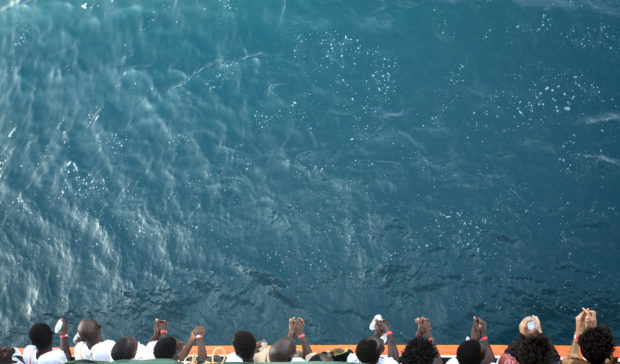EU extends anti-migrant smuggler mission, without ships

FILE – In this Friday, Sept. 1, 2017 file photo, African migrants who were rescued from the Mediterranean Sea north of the Libyan coast, look out from the deck as the Aquarius vessel of SOS Mediterranee and MSF (Doctors Without Borders) NGOs, approaches the port of Pozzallo on Sicily, Italy. Migrants trying to reach Europe face routine rape and sexual torture throughout their journey _ and especially in Libya _ with men facing abuse nearly as routinely as women, according to a study based on dozens of interviews with aid workers and migrants. (AP Photo/Darko Bandic, File)
BRUSSELS — European Union countries decided Friday to extend the mandate of a naval mission hunting smugglers in the Mediterranean Sea, but took the unusual step of restricting the operation by refusing to allow it to deploy any ships, in an effort to ease tensions with Italy’s anti-migrant government.
Aid groups were shocked by the seemingly absurd prospect of a naval operation without any boats, and lambasted the EU for abandoning people trying to make the perilous crossing from Libya in search of better lives or refuge in Europe.
Even the European Commission conceded that Operation Sophia could be compromised.
“Without naval assets, the operation will not be able to effectively implement its mandate,” spokeswoman Maja Kocijancic warned earlier this week as the plan unfolded.
In a statement, EU headquarters announced that Sophia’s mandate will be extended for six months, until Sept. 30.
Article continues after this advertisementBut it ordered the commander to “suspend temporarily the deployment of the operation’s naval assets for the duration of this extension for operational reasons.”
Article continues after this advertisementInstead, it will deploy more planes and personnel.
Italy commands Operation Sophia, but the populist government in Rome refuses to allow its ships or aid groups’ migrant rescue vessels to disembark in Italian ports.
“EU member states will continue to work in the appropriate fora on a solution on disembarkation” of rescued migrants, the statement said, without elaborating.
Well over a million migrants entered Europe in 2015, overwhelming reception centers in Greece and Italy. But arrivals into Italy are now at their lowest levels for seven years.
Still, fears over migration have proved a sure-fire vote winner for populists, and governments like those in Italy and Hungary are homing in on the issue in the run-up to the May 23-26 EU elections.
Launched in 2015, Operation Sophia tackles migrant smugglers, trains the Libyan coastguard and helps enforce a U.N. arms embargo on Libya.
It does no search and rescue work unless its vessels happen to be close to migrants in distress.
Indeed, it was only involved in one such incident between June and Nov. 30 last year.
Doctors Without Borders, which was criticized by Rome for attracting migrants with its sea rescue effort, has described the EU move as “irresponsible and reckless.” /gsg